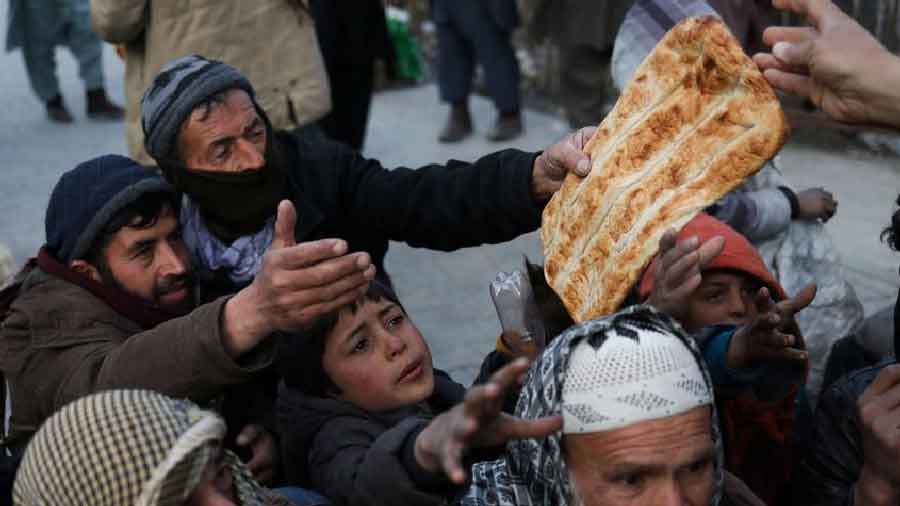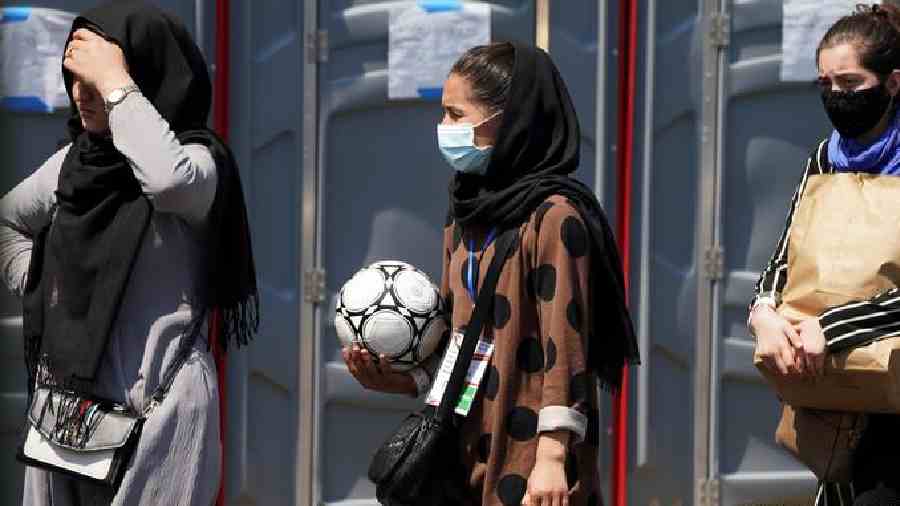More than a million children are severely malnourished and half of Afghanistan's population is going hungry. The humanitarian catastrophe is being made worse by ongoing sanctions against the Taliban.
"Hell on Earth" is how David Beasley, the executive director of the UN World Food Programme (WFP) described the situation in Afghanistan at the end of last year. Since the Taliban returned to power in August 2021, the shooting, bombing and fighting have subsided. However, the Brussels-based think tank International Crisis Group fears that "hunger and hardship following the Taliban takeover could kill more Afghan people than all the bombs and bullets of the last two decades."
Nora Hassanien, acting country director in Afghanistan for the humanitarian organization Save the Children, told DW of "desperate families" who were having to resort to increasingly "extreme and harmful coping strategies."
"That includes selling their children," Hassanien said, "and other things which they would otherwise never do."
Unprecedented hunger crisis
The statistics are as dramatic as the individual stories behind them. According to the WFP, about 20 million people — half the population — require urgent food aid.
But there is not enough money, according to the WFP country director for Afghanistan, Mary-Ellen McGroarty. At an online press conference in July, she explained that decisions on who to feed are made based on the individual's current nutritional situation or their particular vulnerability. McGroarty spoke of an "extremely difficult and often heartbreaking" decision-making process.
The health sector is collapsing, too. Samira Sayed Rahman, who works for the aid organization International Rescue Committee (IRC), told DW what she saw when she visited a hospital in the eastern province of Paktia: There were not enough doctors, not enough nurses. "The doctors we spoke with have not been paid for the past six months," she said. "The wards were full of women cradling malnourished children. In the neonatal unit, three babies had to share an incubator."
The country faces many crises
Afghans are struggling with many crises. There is the devastation brought about by decades of war. Climate change has led to droughts across large parts of the country for three years. Elsewhere, it has caused flooding or unseasonal snowfall in the middle of June. This year, the country suffered another major earthquake. But the biggest challenge, according to Rahman from the IRC, is the suspension of payments from abroad.
For 20 years, the West was heavily involved in Afghanistan: militarily, politically and in development cooperation. The international community covered three-quarters of public expenditure. A plethora of development projects saw roads, schools and hospitals built and provided for their upkeep. But after the Taliban took power, the flow of money was cut off overnight.
"There were about 400,000 people employed in the public sector, plus about 200,000 in the security sector," Rahman explained. "Many of these jobs have disappeared; unemployment is higher than ever and so is inflation."
Sanctions add to the chaos
The Taliban were partners of the US for peace talks, which quickly mutated into withdrawal negotiations. But the government they formed is isolated and not internationally recognized. This has brought the flow of money to a standstill. In addition, sanctions that were put into effect against Islamist terrorists are now also affecting the government apparatus led by the Taliban, and therefore the entire country.
Human Rights Watch Director Kenneth Roth writes that aid isn't enough without a functioning banking system that is not hamstrung by sanctions.
There are two types of sanctions. The UN and EU have imposed sanctions against individual members of the Taliban — including members of, as the German Foreign Ministry calls it in its official terminology, "the de-facto government." The US has also unilaterally imposed sanctions against the Taliban, beginning in 1999. The US strengthened sanctions in 2001 and listed the Taliban as a "Specially Designated Global Terrorist Organization" (SGDT).
The goal of these sanctions is the economic isolation of Afghanistan, according to Conrad Schetter from the Bonn International Center for Conflict Studies (BICC). "All economic opportunities are being cut off. Anything beyond humanitarian aid has been suspended; all development projects in the country have been suspended," he said, Afghanistan has been completely decoupled from economic and financial markets, Schetter said. "The Afghans have been catapulted back into a subsistence economy," the conflict researcher concluded.
A central bank without foreign exchange
Another contributing factor was the US administration's decision to freeze the assets of Afghanistan's central bank, about €7 billion ($7.2 billion), and to withhold half of it as possible compensation for the victims of the terrorist attacks of September 11, 2001.
That is a legally questionable move, according to the UN special rapporteur on unilateral coercive measures, Alena Douhan. "From an international law perspective, the money of a central bank belongs not to the government, but to the country," Douhan told DW.
Without access to its foreign exchange reserves, the central bank is very limited in the extent to which it can perform its role in the Afghan economy. Sanctions and the lack of foreign currency make transferring money to Afghanistan nearly impossible.
In theory, special permits can be used for humanitarian purposes. In practice, however, they are very difficult to obtain. This also applies to German aid for Afghanistan. When asked by DW, a spokesman from the Federal Ministry for Economic Cooperation and Development (BMZ) described the "non-functioning banking sector, which makes it difficult to get money to Afghanistan at all," as "a major challenge in implementing the plans."
Dependent on hawala networks
Humanitarian groups must therefore adopt unconventional methods. In an interview with DW, Elke Gottschalk, regional director for Asia for the German aid organization Welthungerhilfe, described how money transfers must be processed through alternative channels, called hawala networks. It works like this: Welthungerhilfe transfers money to the account of a hawala dealer, known as a hawaladar, in a third country. "This agent then makes sure that money arrives in Kabul — in cash. We count it, then it can be used."
The International Rescue Committee is also reliant on the hawala system, Samira Sayed Rahman confirmed. However, this is "not a reliable and sustainable method." When it comes to hunger in Afghanistan, Rahman is convinced that: "This crisis is man-made; it was caused by the international community." Nora Hassanien of Save the Children shares that assessment, adding: "No amount of humanitarian aid will really solve the problem here. It needs a bigger-picture solution."
An end to isolation
This is also the view of the International Crisis Group. In June, after a visit to Kabul, the think tank's Afghanistan specialist Graeme Smith wrote: "Pulling back from the precipice of a more profound disaster will require ending the country's isolation, attracting development aid, and persuading Western and regional governments to help with economic recovery."
The dilemma remains that this can be done only by cooperating with a regime that massively violates human rights — especially those of minorities, women and girls. The administrator of the United Nations Development Program, Achim Steiner, made his position on this clear. At the World Economic Forum in Davos in May, he said, 'We cannot abandon 40 million Afghans simply on the principle of moral outrage."
From Deutsche Welle Newsfeed












